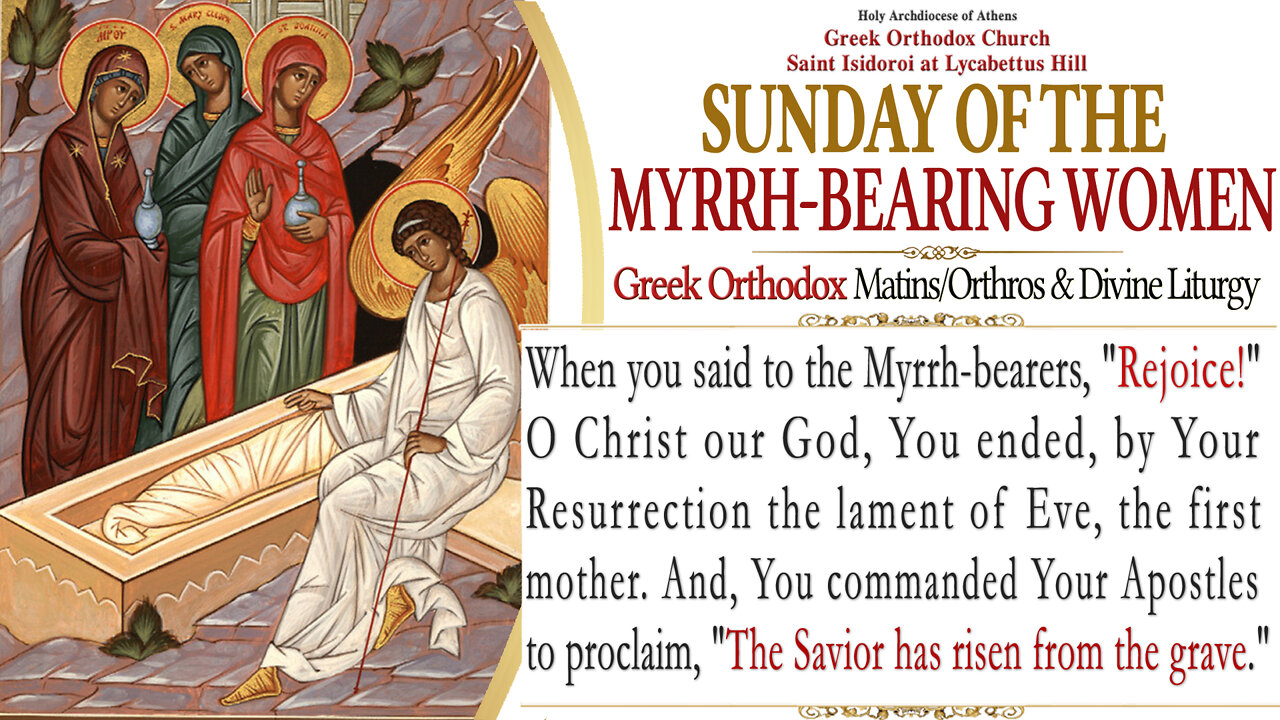Premium Only Content

May 8, 2022, Sunday of the Myrrh-Bearing Women | Greek Orthodox Divine Liturgy
About the beginning of His thirty-second year, when the Lord Jesus was going throughout Galilee, preaching and working miracles, many women who had received of His beneficence left their own homeland and from then on followed after Him. They ministered unto Him out of their own possessions, even until His crucifixion and entombment; and afterwards, neither losing faith in Him after His death, nor fearing the wrath of the Jewish rulers, they came to the sepulchre, bearing the myrrh-oils they had prepared to annoint His body. It is because of the myrrh-oils, that these God-loving women brought to the tomb of Jesus that they are called the Myrrh-bearers. Of those whose names are known are the following: first of all, the most holy Virgin Mary, who in Matthew 27:56 and Mark 15:40 is called "the mother of James and Joses" (these are the sons of Joseph by a previous marriage, and she was therefore their step-mother); Mary Magdalene (celebrated July 22); Mary, the wife of Clopas; Joanna, wife of Chouza, a steward of Herod Antipas; Salome, the mother of the sons of Zebedee, Mary and Martha, the sisters of Lazarus; and Susanna. As for the names of the rest of them, the evangelists have kept silence (Matt 27:55-56; 28:1-10. Mark 15:40-41. Luke 8:1-3; 23:55-24:11, 22-24. John 19:25; 20:11-18. Acts 1:14).
Together with them we celebrate also the secret disciples of the Saviour, Joseph and Nicodemus. Of these, Nicodemus was probably a Jerusalemite, a prominent leader among the Jews and of the order of the Pharisees, learned in the Law and instructed in the Holy Scriptures. He had believed in Christ when, at the beginning of our Saviour's preaching of salvation, he came to Him by night. Furthermore, he brought some one hundred pounds of myrrh-oils and an aromatic mixture of aloes and spices out of reverence and love for the divine Teacher (John 19:39). Joseph, who was from the city of Arimathea, was a wealthy and noble man, and one of the counsellors who were in Jerusalem. He went boldly unto Pilate and asked for the body of Jesus, and together with Nicodemus he gave Him burial. Since time did not permit the preparation of another tomb, he placed the L
The word Liturgy is ancient and means every work done for the people. In the Orthodox Church, the rite of the Holy Eucharist was called the Liturgy. The Holy Eucharist is the oldest experience of Christian Worship as well as the most distinctive. Eucharist comes from the Greek word which means thanksgiving. In a particular sense, the word describes the most important form of the Church's attitude toward all of life. The origin of the Eucharist is traced to the Last Supper at which Christ instructed His disciples to offer bread and wine in His memory. The Eucharist is the most distinctive event of Orthodox worship because in it the Church gathers to remember and celebrate the Life, Death, and Resurrection of Christ and, thereby, to participate in the mystery of Salvation.
In the Orthodox Church, the Eucharist is also known as the Divine Liturgy. As we mention before the word liturgy means people's work; this description serves to emphasize the corporate character of the Eucharist. When an Orthodox attends the Divine Liturgy, it is not as an isolated person who comes simply to hear a sermon.
Watch live from the Greek Orthodox Church of Saint Isidoroi at Lycabettus Hill, the Matins/Orthros and the Divine Liturgy. The small church of Saint Isidoroi belongs to the Holy Archdiocese of Athens and is located on the west side of Lycabettus Hill in Athens, built inside the largest cave on the hill. According to tradition, this cave was a place of ascetic life of the Christians of the first centuries.
Sunday of the Myrrh-Bearing Women
-
 2:27:34
2:27:34
Greek Orthodox Church St. Isidoroi, Athens, Greece
2 years agoNovember 4, 2022, St. George Karslidis the Confessor | Greek Orthodox Divine Liturgy
1061 -
 4:22:34
4:22:34
Akademiks
7 hours agoNicki Minaj vs Dez Bryant. Trump Calls out Charlamagne. Diddy Denied Bail Again! ICEMAN soon?
57.2K3 -
 3:16:28
3:16:28
Nerdrotic
9 hours ago $7.78 earnedNerdrotic at Night 504
76.3K3 -
 8:20:30
8:20:30
Dr Disrespect
17 hours ago🔴LIVE - DR DISRESPECT - WARZONE - RANDOMLY GENERATED LOADOUTS EVENT
227K9 -
 1:36:07
1:36:07
Glenn Greenwald
11 hours agoTrump Admin Unleashes More Policies That Prioritize Israel Over American Citizens; The Smear Campaign Against Gaza Aid Whistleblower with Journalist Mel Witte | SYSTEM UPDATE #497
139K192 -
 58:14
58:14
MattMorseTV
10 hours ago $14.29 earned🔴Hakeem just lost EVERYTHING.🔴
80.2K58 -
 9:21:36
9:21:36
Rallied
13 hours ago $3.19 earnedWARZONE CHALLENGES WITH DRDISRESPECT & BOB
83.3K5 -
 7:15:14
7:15:14
SpartakusLIVE
10 hours agoMonday MOTIVATION leaves viewers ENERGIZED and MAXIMIZED to conquer the week
37.3K1 -
 3:19:17
3:19:17
Barry Cunningham
9 hours agoPRESIDENT TRUMP IS THE SUM OF THEIR FEARS! IT HAS BEGUN!
66.2K71 -
 58:25
58:25
Donald Trump Jr.
14 hours agoMike Benz Takes us Inside the Global Censorship Complex | Triggered Ep264
128K128